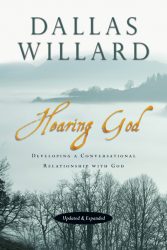
In Masterclass in writing Dr. Royce Francis not only weaves together theological reflection and practical suggestions on becoming a skilled writer in general and within one’s field, but also offers exercises to put the ideas in practice. If along the way you have missed some of “the classes,” click here. Questions and conversation are welcome—feel free to use the Comments section to express them, or email them to http://www.intervarsity.org/contact/emerging-scholars-network.
Scripture Focus
Whoever has my commandments and keeps them, he it is who loves me. And he who loves me will be loved by my Father, and I will love him and manifest myself to him… If anyone loves me, he will keep my word, and my Father will love him, and we will come to him and make our home with him. —John 14:21,23, ESV
Reflection
For the past 8 weeks, we have been reflecting on writing disciplines for an academic who believes in Jesus. But for the next four weeks, let’s talk about why your writing is important. I want to speak first about obedience.

A while ago, I read an interesting book by Mark Noll titled The Scandal of the Evangelical Mind. Months later, what remains in my memory of this book is that it is a scandal that evangelicals, at the time the book was written, had almost no meaningful academic or intellectual influence on the culture. Evangelical thought had become divorced from historical deliberations in the church on a wide range of cultural topics or issues, and it had become almost a badge of honor for evangelicals to eschew involvement in intellectual spaces. A distrust of intellectuals and intellectual work such as politics, academics, science, arts and drama crept in and took root among evangelicals. As a result, there may possibly be no evangelical voice that is widely respected on any issue important to culture or society.
While my takeaway may be crude or inaccurate with respect to Noll’s ideas, I don’t think it’s far enough off to invalidate what I’d like to say about all this: Christians who are called to intellectual and cultural pursuits are either being disobedient; or, Christians who are raising and discipling intellectual and cultural workers—current or future—are failing in their efforts at spiritual formation.
I simply am unwilling to believe that God has not been standing in fields such as evolutionary biology, critical race theory and intersectionality, political economy, bioethics, cryptography, and so on. I am simply unwilling to believe that Jesus is not present in these fields calling his people to come and look at the truths hidden there with him. No, I believe that his people are refusing his call.
If you are one of the people reading this post, you are not refusing him. But maybe you have difficulty understanding why you are working where you are. Maybe you have difficulty understanding why, if God has called you to this work, you can’t talk openly about it with your friends and family. You probably can’t understand why, if God has called you to this work, you don’t hear your work ideas engaged from the pulpit, Bible study, or small group gathering. And you might even have difficulty understanding how to integrate all of this together so that you can have peace about what you have been drawn to.
This week, I want you to be encouraged. I want you to look again at John 14:21 and 23. Do you see what Jesus promises us? He says that if anyone hears his commands and obeys them, He and His Father will come to them and make their home with them. He is making his home with you and will not leave you alone. He will manifest himself to you. Our job is just to be obedient to his call to the professions where he has placed us.
Action
To be honest with you, recent events in our country have made it very clear that we have a very poor understanding about what it means to follow Christ. For our conversation, the one thing worth pointing out is that our religious expressions too often focus on the things we can completely understand. Or, at least that we can name and put in a box. Our obedience to Christ is cast as tearing down everyone or everything that does not fit in that box.
On the contrary, our obedience to Christ involves building up his world. Building his artifice. Building his body, his kingdom, and his temple. Building is much harder work than destroying. Building is much more deliberate and costly work than tearing down. And above all of this, creative destruction, that is, re-making something that exists into something new, is the hardest work of all. As academics, we can be tempted to engage primarily in tearing down. In destructive criticism. In critical analysis. But are we doing creative work that requires the voice of God? Are we practicing creative destruction, and watching God make all things new in our work?
This week, I want you to take the following actions:

- Intentionally listen for the voice of God as part of your work day. If you have never heard of the voice of God, or never heard that you can hear the voice of God, I want you to take some time to read about it. Get in the habit of conversing with God about the work you are doing. One verse that has been challenging for me in regard to this point is John 8:47, “Whoever is of God hears the words of God. The reason why you do not hear them is that you are not of God.” If no one has ever talked with you about listening to God or conversing with God, please send me an email and I will share with you some resources or thoughts about this. Hearing God by Dallas Willard is an excellent start. Jesus is the architect of what you are called to help him build, and He is the one in responsible charge of the work. Therefore, we should be listening to His voice as we work.
- Write down what you think God is speaking to you about, and seek out friends, family members, colleagues, or church members to talk with about it. You should learn how to talk about “shop” without “talking shop.” [Isn’t this what a good writer does anyways?] Seek to speak with those who are, and those who are not, Christians. You should not necessarily say to those whom you speak with that you are hearing this from God. Instead, think of this as part of the conversation. Just as with writing, your conversations are going to unfold the mystery of the thing that has captured your interest. As you speak with others, with your heart intent on obeying what you understand to be God’s guidance, the clarity of your journey will unfold.
I wish I had more time to talk on this issue. Maybe in the comments you all will raise some important and relevant concepts we can explore together. How did you learn to hear from God concerning your academic pursuits? I’d love to learn from you.
Peace and Blessings.
Royce
Royce is an associate professor of engineering management and systems engineering at the George Washington University. He conducts and teaches under the broad theme “SEEDâ€: Strategic [urban] Ecologies, Engineering, and Decision making. His research and teaching interests include infrastructure sustainability and resilience measurement, risk analysis, and drinking water systems analysis. Royce is a member of the American Society of Civil Engineers (ASCE), and the Society for Risk Analysis (SRA).

Sad, but true: “For our conversation, the one thing worth pointing out is that our religious expressions too often focus on the things we can completely understand. Or, at least that we can name and put in a box. Our obedience to Christ is cast as tearing down everyone or everything that does not fit in that box.”
That is the legacy of what Noll was talking about, which unfortunately is still with us. Fortunately, as in the past God preserved a faithful remnant, so it is is today. Whether those few are enough to turn the course of the nation is a different matter. Hosea seems to be addressed directly to modern America, but I am not sure the church is listening.